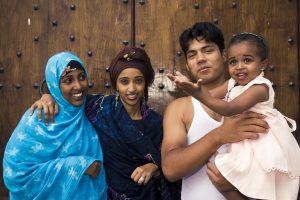
A group of migrants welcomed in Riace.
When did haven become a crime? How did seeking shelter or asylum come to identify a person as a criminal? Since women and children are the face, and multitudinous faces, of today’s refugee, when did the State choose to identify those seeking haven, women and children, as criminals?
In 1999, Nell Toussaint, a Grenadan, entered Canada on a tourist visa, and stayed. She lived in Toronto, apparently without disturbing anyone’s peace. Then in 2006, Toussaint developed a kidney ailment. This involved blood clots, diabetes, tumors. Faced with mounting health debt, and with death, in 2008 Toussaint applied for permanent residency. She applied, but did not pay the fees. So, she was not considered for application.
She applied for health care coverage, and was turned down. She went to court. Last Friday, the Federal Court of Appeal unanimously rejected her application. The Court decided that as an undocumented resident, Toussaint did not qualify for coverage … even though it agreed that her medical condition could result in death if not treated.
But there is a principle higher than that of life and death: “If the appellant were to prevail in this case and receive medical coverage under the Order in Council without complying with Canada’s immigration laws, others could be expected to come to Canada and do the same. Soon … Canada could become a health care safe haven, its immigration laws undermined.”
Canada could become a health care safe haven. Haven is the menace, and haven is the crime committed by Nell Toussaint. If Nell Toussaint dies for the cause of eliminating the Caduceus Crime of health care safe haven, that’s fine.
But that’s not fine.
Riace, a town in the south of Italy, was suffering population loss. Maybe that’s the reason it opened its doors, “huge heart”, and more, to refugees like Helen, an Ethiopian who arrived two years ago. But Riace did more than just allow refugees to settle. The townspeople created opportunities, economic and cultural, for mutual integration. When the national government was too slow in providing funds for the refugees, Riace invented its own local currency, the Euro-Riace, acceptable at all the finest, and funkiest, local shops.
Riace is not heaven, and its motives are in no way pure or angelic. Indeed, they’re pragmatic. No matter. The town, together, agreed to the policy and practice of haven. The town, together, now supports Città Futura, the City of the Future, the single largest employer in Riace.
The State can opt to become a haven. People can choose to embrace and live courageously, with huge heart, with the vulnerable and the stranger. Right now, the world lives with the highest number of refugees and displaced persons in decades. The majority of refugees are women and girls. Haven is more than a women’s issue. Haven is a women’s world. Women haunt the `crime’ of seeking haven.
(Photo Credit: http://urbanpollinators.co.uk)